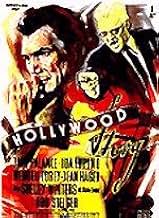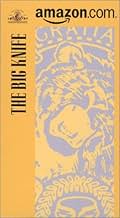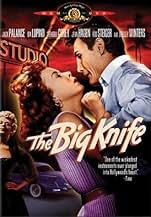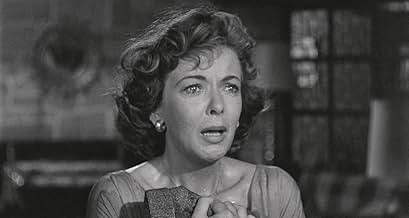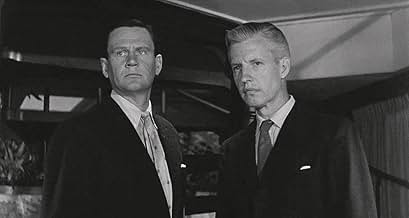IMDb रेटिंग
6.8/10
4.6 हज़ार
आपकी रेटिंग
अपनी भाषा में प्लॉट जोड़ेंHollywood actor Charles Castle is pressured by his studio boss into a criminal cover-up to protect his valuable career.Hollywood actor Charles Castle is pressured by his studio boss into a criminal cover-up to protect his valuable career.Hollywood actor Charles Castle is pressured by his studio boss into a criminal cover-up to protect his valuable career.
- पुरस्कार
- 1 जीत और कुल 2 नामांकन
Michael Winkelman
- Billy Castle
- (as Mike Winkelman)
Shelley Winters
- Dixie Evans
- (as Miss Shelley Winters)
Richard Boone
- Narrator
- (वॉइस)
- (बिना क्रेडिट के)
Nick Cravat
- Nick
- (बिना क्रेडिट के)
Robert Emhardt
- Bit Part
- (बिना क्रेडिट के)
Michael Fox
- Prize Fight Announcer
- (बिना क्रेडिट के)
Paula Kyle
- Party Guest
- (बिना क्रेडिट के)
फ़ीचर्ड समीक्षाएं
Unless you understand that The Big Knife was Clifford Odets's one finger salute to Hollywood and its mores, you will not understand the film at all. Odets after some bad times in tinseltown went back to his first love which was the theater and wrote this play which ran for 109 performances in the 1949 season on Broadway.
In the lead roles of actor Charlie Castle and producer Marcus Hoff, Odets cast a couple of guys who were having difficulty finding employment in Hollywood at that time as well, kindred spirits from the Group Theater back in the day, John Garfield and J. Edward Bromberg. Garfield who certainly could bring his own life into the part plays Odets himself who had as tempestuous personal life as his creation Charlie Castle. He feels starved creatively because of the junk he's been doing in Hollywood, not the stuff of social significance that Odets did back Group Theater days.
Jack Palance plays Castle in the film and while he does justice to the part I only wish John Garfield had lived to do the screen version of what he created. He had an unceasing rebellion against Warner Brothers for the stereotypical tough guys parts he was being cast in. But just after he broke free came the blacklist.
Rod Steiger is malevolence itself as the producer whom I believe was based on Louis B. Mayer. Odets dealt with him through his then wife Luise Rainer over at MGM. Mayer was not liked even by his fellow studio moguls and he had been toppled in a studio power play at MGM a few years earlier. Had he still been in charge at MGM, I'm willing to bet The Big Knife might never have been made even as an independent film with a United Artists release.
Director Robert Aldrich filled out the rest of the cast with familiar Hollywood names like Ida Lupino as Palance's estranged wife, Everett Sloane as his long suffering agent, Wendell Corey in a role that has to be modeled on MGM's fixer who knew where all the bodies were buried Eddie Mannix, Shelley Winters as the bimbo like starlet who can put an end to Palance's career and Ilka Chase as a Hedda Hopper like columnist who is the self appointed keeper of the Hollywood morals. Chase's scenes are at the beginning of the film and she really has the columnist character dead on.
On stage the entire play is set in the living room of the Palance/Lupino Hollywood style mansion. Like the house in Long Day's Journey Into Night, the opulent living room becomes a character itself, showing the velvet and comfortable trap that Palance is in and why he just can't give up all this comfort, even for the art that used to motivate him.
Odets might have done better had someone else a little more dispassionate had written this based on his memoirs. The Big Knife gets a little too personal at times. And it never quite loses the stage origin even with a few scenes away from the house. But the acting his first rate from a first rate cast. I'd watch The Big Knife as a look into the mind of Clifford Odets.
In the lead roles of actor Charlie Castle and producer Marcus Hoff, Odets cast a couple of guys who were having difficulty finding employment in Hollywood at that time as well, kindred spirits from the Group Theater back in the day, John Garfield and J. Edward Bromberg. Garfield who certainly could bring his own life into the part plays Odets himself who had as tempestuous personal life as his creation Charlie Castle. He feels starved creatively because of the junk he's been doing in Hollywood, not the stuff of social significance that Odets did back Group Theater days.
Jack Palance plays Castle in the film and while he does justice to the part I only wish John Garfield had lived to do the screen version of what he created. He had an unceasing rebellion against Warner Brothers for the stereotypical tough guys parts he was being cast in. But just after he broke free came the blacklist.
Rod Steiger is malevolence itself as the producer whom I believe was based on Louis B. Mayer. Odets dealt with him through his then wife Luise Rainer over at MGM. Mayer was not liked even by his fellow studio moguls and he had been toppled in a studio power play at MGM a few years earlier. Had he still been in charge at MGM, I'm willing to bet The Big Knife might never have been made even as an independent film with a United Artists release.
Director Robert Aldrich filled out the rest of the cast with familiar Hollywood names like Ida Lupino as Palance's estranged wife, Everett Sloane as his long suffering agent, Wendell Corey in a role that has to be modeled on MGM's fixer who knew where all the bodies were buried Eddie Mannix, Shelley Winters as the bimbo like starlet who can put an end to Palance's career and Ilka Chase as a Hedda Hopper like columnist who is the self appointed keeper of the Hollywood morals. Chase's scenes are at the beginning of the film and she really has the columnist character dead on.
On stage the entire play is set in the living room of the Palance/Lupino Hollywood style mansion. Like the house in Long Day's Journey Into Night, the opulent living room becomes a character itself, showing the velvet and comfortable trap that Palance is in and why he just can't give up all this comfort, even for the art that used to motivate him.
Odets might have done better had someone else a little more dispassionate had written this based on his memoirs. The Big Knife gets a little too personal at times. And it never quite loses the stage origin even with a few scenes away from the house. But the acting his first rate from a first rate cast. I'd watch The Big Knife as a look into the mind of Clifford Odets.
"The Big Knife" is really a stage play recorded on film. It's a Hollywood soap opera that features a lot of good actors eating the scenery. Rod Steiger and Everett Sloan are great as the monstrous studio honcho and weaselly agent, respectively. Jack Palance is a competent actor but was woefully miscast as the sensitive, tortured matinée idol -- nobody would ever confuse Palance with a matinée idol. Nevertheless, he does an adequate job.
The power of the studio system in the '50s is well depicted, if a bit overwrought. Steiger's performance is particularly delicious as his toweringly self-centered character cries, wheedles, and intimidates his underlings into doing what he wants.
The movie is showing its age but its excesses, especially its colorful language, are a lot of fun. Recommended, 7 out of 10.
The power of the studio system in the '50s is well depicted, if a bit overwrought. Steiger's performance is particularly delicious as his toweringly self-centered character cries, wheedles, and intimidates his underlings into doing what he wants.
The movie is showing its age but its excesses, especially its colorful language, are a lot of fun. Recommended, 7 out of 10.
This film is a thinly veiled discussion of various rumors about various big-name actors. Many times over the years, studio heads reportedly paid to bail big stars out of legal jams. And, while you can't prove exactly what happens, people talk and say that the studios paid people off and hid the crimes of its stars. A few examples of the cases which MAY have been covered up would include: Thomas Ince's death aboard William Randolph Hearst's yacht, the death of Jean Harlow's husband, the beating death of Ted Healy (recent stories say Wallace Beery was responsible) and MANY other scandals too numerous to list here. It's like "The Big Knife" is trying to expose these scandals without being too specific--otherwise the filmmakers could have either been sued or blackballed. This film is a lot grittier and cynical than other previous films that look at the dark side of Hollywood (such as "What Price Hollywood?" and "A Star is Born")--and I am pretty sure the studio execs breathed a deep sigh of relief when "The Big Knife" failed at the box office!
"The Big Knife" is not exactly what you'd expect given the film's title or that it's about a killing. You'd think it was an action film, but it isn't. In fact, the film is very non-action--with almost all of the film taking place in a guy's home--and often in just one or two rooms. The only action is when folks TALK about what has already happened or when the ego-centric main character shows his guests an old boxing film he made years earlier.
Jack Palance plays Charles Castle--a famous movie star who has been making a lot of movies which, in his and other people's opinions, are beneath him. He's bored with these sort of films and unhappy about the state of his life. However, his divorce and the crap that the studio forces him into are all his own doing. He cheated on his wife repeatedly and as for the studio, there comes the interesting part of the film. Apparently, years before, Castle was driving drunk and killed someone. But, the studio's 'fixers' came in and got a guy to take the blame--and allowed their money-maker, Castle, to keep on making films. So, when Castle pushes the execs for better films, their ultimate trump card is to expose Castle's guilt in killing someone! He's stuck. At times, the viewer might be inclined to feel a bit sorry for him--but throughout the film he keeps reminding the viewer that down deep, he is a jerk--as are most of the folks in this film. And, just how big an amoral jerk he might be is tested when a fixer (Wendell Corey) has to take care of one more loose end...and wants Castle's help.
For the most part, this is a very good film. Palance and the rest (particularly Corey) are very good. There is one exception, however. While Everett Sloane was a wonderful actor, here he is oddly miscast. Seeing him play an agent and saying 'darling' all the time to Palance just didn't seem believable in the least. They really needed someone oilier--someone who could just drip fake charm--though he WAS very good later in the film during his big scene (at about 90 minutes into the movie). I might have enjoyed seeing someone like, perhaps, Zachary Scott in this part--as he could ooze snake-like charm. Apart from this minor problem, the film delivers--with a resounding indictment on the sleazy dark side of the film industry. It also really helps that the film ended as well as it did--the finale is impressive. Well worth seeing provided you don't mind that the action is all on the cerebral side and not in the great outdoors.
"The Big Knife" is not exactly what you'd expect given the film's title or that it's about a killing. You'd think it was an action film, but it isn't. In fact, the film is very non-action--with almost all of the film taking place in a guy's home--and often in just one or two rooms. The only action is when folks TALK about what has already happened or when the ego-centric main character shows his guests an old boxing film he made years earlier.
Jack Palance plays Charles Castle--a famous movie star who has been making a lot of movies which, in his and other people's opinions, are beneath him. He's bored with these sort of films and unhappy about the state of his life. However, his divorce and the crap that the studio forces him into are all his own doing. He cheated on his wife repeatedly and as for the studio, there comes the interesting part of the film. Apparently, years before, Castle was driving drunk and killed someone. But, the studio's 'fixers' came in and got a guy to take the blame--and allowed their money-maker, Castle, to keep on making films. So, when Castle pushes the execs for better films, their ultimate trump card is to expose Castle's guilt in killing someone! He's stuck. At times, the viewer might be inclined to feel a bit sorry for him--but throughout the film he keeps reminding the viewer that down deep, he is a jerk--as are most of the folks in this film. And, just how big an amoral jerk he might be is tested when a fixer (Wendell Corey) has to take care of one more loose end...and wants Castle's help.
For the most part, this is a very good film. Palance and the rest (particularly Corey) are very good. There is one exception, however. While Everett Sloane was a wonderful actor, here he is oddly miscast. Seeing him play an agent and saying 'darling' all the time to Palance just didn't seem believable in the least. They really needed someone oilier--someone who could just drip fake charm--though he WAS very good later in the film during his big scene (at about 90 minutes into the movie). I might have enjoyed seeing someone like, perhaps, Zachary Scott in this part--as he could ooze snake-like charm. Apart from this minor problem, the film delivers--with a resounding indictment on the sleazy dark side of the film industry. It also really helps that the film ended as well as it did--the finale is impressive. Well worth seeing provided you don't mind that the action is all on the cerebral side and not in the great outdoors.
Too talky for some, too stage-bound for others, too strident for all, this is not a movie for everyone. Yet The Big Knife continues to fascinate at the same time it annoys. Maybe it's the savage depiction of Hollywood politics and the amoral glamour industry surrounding it. After all, neither blackmail nor murder is off-limits to ego-maniacal studio boss Stanley Hoff ( vintage Rod Steiger), while the human sharks swimming around him behave nothing like opening night at the Oscars. Maybe it's the sterling cast, featuring such 50's exotica as Steiger, Jack Palance, Wendell Corey, and Shelley Winters. In the end, of course, everyone gets to explode on screen except the ice cold Corey whose chronic bemusement proves ultimately more satanic than cynical. Whatever the reason, the result is an over-the-top cavalcade of unusual flair.
It's likely that producer-director Robert Aldrich targeted the film in behalf of blacklisted mentor Abraham Polonsky with whom he had collaborated on 1948's Force of Evil. After all, the year was 1955 and the all-powerful list could not be attacked directly, so what better vehicle than Clifford Odet's corrosive stage play adapted for all America to see. (Odets would do the same for Broadway in 1957's revealing Sweet Smell of Success.) It's fun to imagine how Aldrich's resulting indictment played in studio screening rooms where real reputations were at stake. Then too, much of the film's dirty laundry appears based on fact. The hit and run on Clark Gable's hushed-up 1933 episode; the Palance character on John Garfield's death at 39, listed officially as heart attack. It's hard to picture the producers ever believing such curdled fare would actually make money. Of course it didn't, angering many ticket-buyers with a title that seemed to imply real action instead of endless palaver. Still, this overheated exercise in shameless baroque remains an interesting oddity. A permanent record not only of individual styles, but of artistic protest amidst the throes of cultural repression.
It's likely that producer-director Robert Aldrich targeted the film in behalf of blacklisted mentor Abraham Polonsky with whom he had collaborated on 1948's Force of Evil. After all, the year was 1955 and the all-powerful list could not be attacked directly, so what better vehicle than Clifford Odet's corrosive stage play adapted for all America to see. (Odets would do the same for Broadway in 1957's revealing Sweet Smell of Success.) It's fun to imagine how Aldrich's resulting indictment played in studio screening rooms where real reputations were at stake. Then too, much of the film's dirty laundry appears based on fact. The hit and run on Clark Gable's hushed-up 1933 episode; the Palance character on John Garfield's death at 39, listed officially as heart attack. It's hard to picture the producers ever believing such curdled fare would actually make money. Of course it didn't, angering many ticket-buyers with a title that seemed to imply real action instead of endless palaver. Still, this overheated exercise in shameless baroque remains an interesting oddity. A permanent record not only of individual styles, but of artistic protest amidst the throes of cultural repression.
Bel Air. The well-manicured area of LA where the successful actors, producers and directors in Hollywood live. So says the opening voice- over.
Jack Palance, not the obvious choice for a leading man (& director Robert Aldrich's lame excuse for the film's box office failure) has never been better, nor has he had such a meaty role. His portrayal of pent-up anger and frustration is powerful yet still believable.
He's the washed up star who's unravelling at the seams, wrestling with a dark secret and Rod Steiger, complete with blonde hairdo as his studio manager who is out to keep a lid on bad publicity at all costs. He will stop at nothing at getting a new contract signed.
Ida Lupino is also extremely fine as Charles Castle's (Palance) wife. Their marriage is on the rocks and she pleads that Charles takes the rest that he desperately needs and to not sign. She won't go back to him otherwise. There's good support from tease Shelley Winters and as Charles' agent, Everett Sloane plus Wendell Corey as a ruthless producer.
Much of the action takes place in the Castle's vast living room, nodding to the theatrics of the original play by Clifford Odets.
This is a slow-burning, quite talky, intelligent character-led and well scripted study of Hollywood's mechanics - its layers of people. Not as flashy or melodramatic as some and certainly not as well known, but still directed with surety and skill. Today's viewer will have to adjust to the pace and style but that's easy and the rewards to those attuned can be high.
There's enough depth to the material for a second viewing, which helps bring out the characters even more vividly.
Jack Palance, not the obvious choice for a leading man (& director Robert Aldrich's lame excuse for the film's box office failure) has never been better, nor has he had such a meaty role. His portrayal of pent-up anger and frustration is powerful yet still believable.
He's the washed up star who's unravelling at the seams, wrestling with a dark secret and Rod Steiger, complete with blonde hairdo as his studio manager who is out to keep a lid on bad publicity at all costs. He will stop at nothing at getting a new contract signed.
Ida Lupino is also extremely fine as Charles Castle's (Palance) wife. Their marriage is on the rocks and she pleads that Charles takes the rest that he desperately needs and to not sign. She won't go back to him otherwise. There's good support from tease Shelley Winters and as Charles' agent, Everett Sloane plus Wendell Corey as a ruthless producer.
Much of the action takes place in the Castle's vast living room, nodding to the theatrics of the original play by Clifford Odets.
This is a slow-burning, quite talky, intelligent character-led and well scripted study of Hollywood's mechanics - its layers of people. Not as flashy or melodramatic as some and certainly not as well known, but still directed with surety and skill. Today's viewer will have to adjust to the pace and style but that's easy and the rewards to those attuned can be high.
There's enough depth to the material for a second viewing, which helps bring out the characters even more vividly.
क्या आपको पता है
- ट्रिवियाBecause of its vitriolic take on Tinseltown, this was unsurprisingly turned down by all the major studios in Hollywood. It eventually found a home at United Artists.
- गूफ़The camera and operator are visibly reflected in one scene in the living room.
- भाव
Smiley Coy: A woman with six martinis can ruin a city.
- क्रेज़ी क्रेडिटIn the opening credits: Upholstered furniture by Martin/ Brattrud.
- कनेक्शनFeatured in Les dossiers de l'écran: Les coulisses du cinéma (1970)
टॉप पसंद
रेटिंग देने के लिए साइन-इन करें और वैयक्तिकृत सुझावों के लिए वॉचलिस्ट करें
- How long is The Big Knife?Alexa द्वारा संचालित
विवरण
बॉक्स ऑफ़िस
- बजट
- $4,23,000(अनुमानित)
- चलने की अवधि1 घंटा 51 मिनट
- रंग
- पक्ष अनुपात
- 1.85 : 1
इस पेज में योगदान दें
किसी बदलाव का सुझाव दें या अनुपलब्ध कॉन्टेंट जोड़ें



